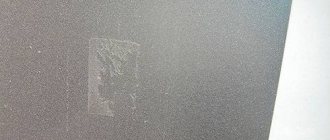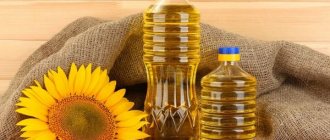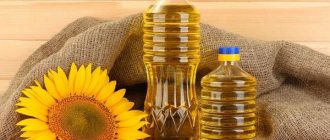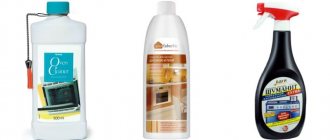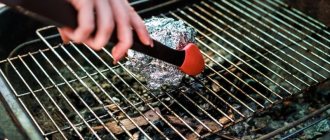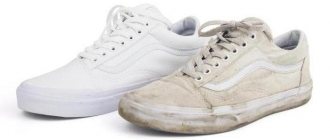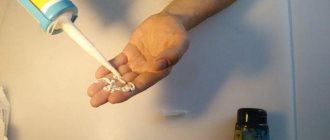At first glance, cleaning glass lids is not difficult. Glass repels dirt. If it sticks, it is very easily removed with ordinary cleaning products. All this is true, except for one “but”: some models of lids for frying pans and pots have hard-to-reach places - a metal lining and a steam hole. Over time, grease and plaque accumulate in them, which cannot be removed with a regular sponge.
How to get rid of burnt fat in the oven?
Take half a glass of baking soda and dilute it with a few tablespoons of water. Apply the resulting paste mixture to the inner surfaces of the oven, to the grate and to the baking sheets. You can use a sponge for application. Leave the oven like this overnight – at least 8 hours.
Interesting materials:
How to prevent people from seeing your date of birth on Facebook? How to make it so that only the name appears on YouTube? How to make it be night in Minecraft? How to make it light in Minecraft? How can I prevent my date of birth from being visible in my classmates? How to make sure there are no squares in Sims 4? How to make your Sim lose weight in Sims 4? How can I make it possible to speak to a button on Skype? How can I prevent it from being visible on WhatsApp that I have read the message? How to make it possible to subscribe to VK?
How to soften grease and dirt?
Old fat becomes hard and firmly eats into the surface. Therefore, the first thing you need to do is soften it. For this you can use:
- Hydrogen peroxide. 3% peroxide should be poured under the rim of the lid and left for 10 minutes. The solution corrodes organic compounds, including plaque and grease. The steam hole can be cleaned using soaked cotton wool.
- Laundry soap and soda. They contain a lot of alkali, which copes well with fatty deposits. Place the lids in a large saucepan, add 5 tbsp. spoons of baking soda, 1 tbsp. a spoonful of laundry soap, 5 liters of water and boil over low heat for 15 minutes.
- Dish detergent and boiling water. Dishwashing detergents do a great job of softening old grease. It is enough just to use hotter water and increase the exposure time. Soak the glass lid of a frying pan or saucepan in boiling water with the addition of 1 tbsp. spoons of detergent. When the water has cooled, the product can be cleaned of fat in one motion.
We recommend: Cleaning the kitchen floor with a steam cleaner: how I do it
Removing carbon deposits and greasy stains from glass baking dishes
Any glassware for the oven sooner or later becomes dirty and acquires a non-specific brownish color. Spots of burnt fat appear on its surface, which are not so easy and quick to remove. Moreover, the appearance of contamination occurs regardless of whether your glassware is inexpensive or elite.
Do you believe in the benefits of visiting cosmetologists?
Not really
Drops of dried fat are much more difficult to deal with than removing limescale deposits formed from water. Therefore, you will have to resort to stronger and more complex means. But you can also prepare the compositions yourself.
Composition with laundry soap
Not every housewife knows how to clean glassware from grease using laundry soap. Although this is a very old and very effective method that was used by previous generations. The method definitely deserves attention today. Laundry soap will help eliminate grease stains of any kind, even the most old ones.
- laundry soap 72% - 0.5-1 pcs. (depending on the size of the dishes);
- pure water.
- Using a grater or a sharp knife, you need to make soap shavings and pour them into the dishes that will be cleaned.
- Fill with water so that it does not reach 4-5 centimeters from the upper border of the mold or tray. Place in the oven and preheat the device to 180 degrees. When the contents of the dish boil, the temperature must be reduced.
- Now it is important to let the soap solution simmer for half an hour.
- Then leave the mixture in the oven until it cools completely.
- Only after this can the solution be disposed of and the dishes cleaned with a hard sponge.
Solution with citric acid and vinegar
Thanks to the active substances contained in the well-known lemon and vinegar, the solution is quite powerful. If you don’t know how to clean glassware from carbon deposits and grease, try this one. The method is quite simple and quick to implement. It does not require any expensive components.
- clean water – 1 l;
- table vinegar - 0.5 tbsp.;
- citric acid – 1 tbsp. l.
- The required amount of water must be brought to a boil.
- Next, dissolve vinegar and a spoonful of citric acid in boiling water.
- Soak the tray or baking dish that has oven residue and frozen drops of fat in the resulting solution.
- Leave for 1 hour.
- Then you need to clean the glass surfaces with a stiff brush or brush.
Mustard powder remedy
This effective method will help get rid of even the oldest grease on glassware. In combination with hot water, mustard works real miracles! To see this from your own experience, just try it. The method is simple and absolutely safe.
- hot water – 2 l;
- mustard powder – 100 g.
Industrial methods
The easiest way to clean is to purchase any grease remover. It even copes with old plaque. The only thing you need to remember is that after using such products you need to rinse the dishes well so that no traces of chemicals remain. Best for fat loss:
- "Sif";
- "Comet";
- "Master Cleaner";
- "Shumanite."
How to wash dishes with a narrow neck
For containers with a narrow neck, you can use a brush with nylon bristles. But there are other effective ways to make do with improvised means.
- To wash a cloudy decanter or vase with a green bottom, pour warm water and a spoonful of vinegar into it. Leave for several hours. Then throw rice or sand into the container and shake until the contamination disappears.
- To remove particularly stubborn dirt inside the carafe, you can use a solution of soda or ammonia. Crushed eggshells are used as an abrasive. The vessel is shaken like a shaker, and at the end rinsed very thoroughly.
The most affordable material for filling a carafe can be newspaper. It is torn into small pieces, filled with them into a container with a cleaning solution, and shaken until the walls and bottom are washed.
- Finely crushed eggshells are poured through a narrow neck and filled with warm water; sometimes a little baking soda is added to enhance the effect. Shake the object thoroughly so that the powder “walks” along the walls and bottom. Then wash with clean water, inspect, and if dirt remains, repeat the procedure.
- This method exactly repeats the operation with eggshells, only grated potatoes are used instead.
- The water after boiling potatoes can be used to wash a dirty decanter or vase that you haven’t reached. To do this, pour warm potato broth into a container and leave for several minutes; to enhance the effect, you can add table vinegar and salt. Then shake the vase, swirling the liquid in it, pour out the solution and rinse.
- A detergent composition of ½ tbsp works effectively. rice and one third tbsp. soda, poured with warm water directly in the vessel. It is left for 10 minutes, after which it is shaken and turned so that the thicket passes along all the walls from the inside. Wash off with warm and then cool water.
The listed methods are effective, gentle, safe, simple and inexpensive. With constant home care, glassware will last a long time and shine like new.
We recommend reading: How to remove traces of tape from glass and other surfaces.
How to clean a frying pan outside and inside - 12 best ways
To be honest, cleaning a frying pan from carbon deposits and grease can often be very difficult, especially if it is old or badly burnt. But there is good news: you can still deal with most persistent stains with cheap products that you already have at home (or at least make the task significantly easier). The main thing is to choose the method that is suitable for your frying pan. After all, what a cast-iron saucepan will save, a Teflon pancake maker can hopelessly destroy.
In this article you can find almost all traditional and non-standard methods of cleaning frying pans of any type: cast iron, stainless steel, aluminum with non-stick coating (Teflon, enamel, ceramic, marble) and without it. Just choose the recipe that suits you.
Recommendations from experts
Manufacturers of cookware recommend adhering to rules that help extend the life of the frying pan. It is important to follow preventive measures that prevent further contamination.
- When cooking and stirring food in a frying pan, you must use a wooden or plastic spatula.
- Use cleaning powders, scratching sponges, and scrapers as little as possible. This will prevent scratches on the inside of the pan.
- If the frying pan is often washed in the dishwasher, then you must clean it by hand once a month. In this case, you can easily notice the appearance of soot, which can be easily eliminated at the initial stage of its manifestation.
- Melamine sponges are well suited for cleaning ceramic products and enamel dishes. But they can only clean the outside.
- An aluminum frying pan should never be rubbed with an iron sponge. The damaged surface quickly oxidizes and the oxide gets into the food. Which will negatively affect human health.
- Baking soda or coarse salt helps get rid of rust on an old frying pan. After washing, be sure to heat the dishes so that the food does not burn.
Competent care
Glassware can always remain beautiful if you follow simple rules:
- Do not use a hard sponge when cleaning, as this may cause small scratches, which will make the product look less tidy.
- Glass products must be handled carefully. Impact on the ring or nearby cup may leave marks.
- Drying should be done naturally so that excess water can drain off. If you wipe the products with a cloth, the transparent walls will be covered with lint.
- Glass objects should be washed in cool water, making sure that there are no temperature changes, as this will lead to microcracks.
If the glassware is heavily soiled or has a greasy layer, you can heat the water a little, but it is better to use the soaking method using products that are always on hand.
Boiling with vinegar and citric acid
This method is suitable for enamel or metal lids. It helps to get rid of even old fat, especially on the edges and around the handles. Only if they have plastic parts, they need to be removed first.
How to clean:
- Find a saucepan or basin so that the lid fits completely.
- Pour water, add a glass of 9% vinegar and 25 g of citric acid powder for each liter.
- Bring to a boil, put a lid on it.
- Cook over low heat for half an hour.
- After cooling, wash off the grease with a brush or sponge.
